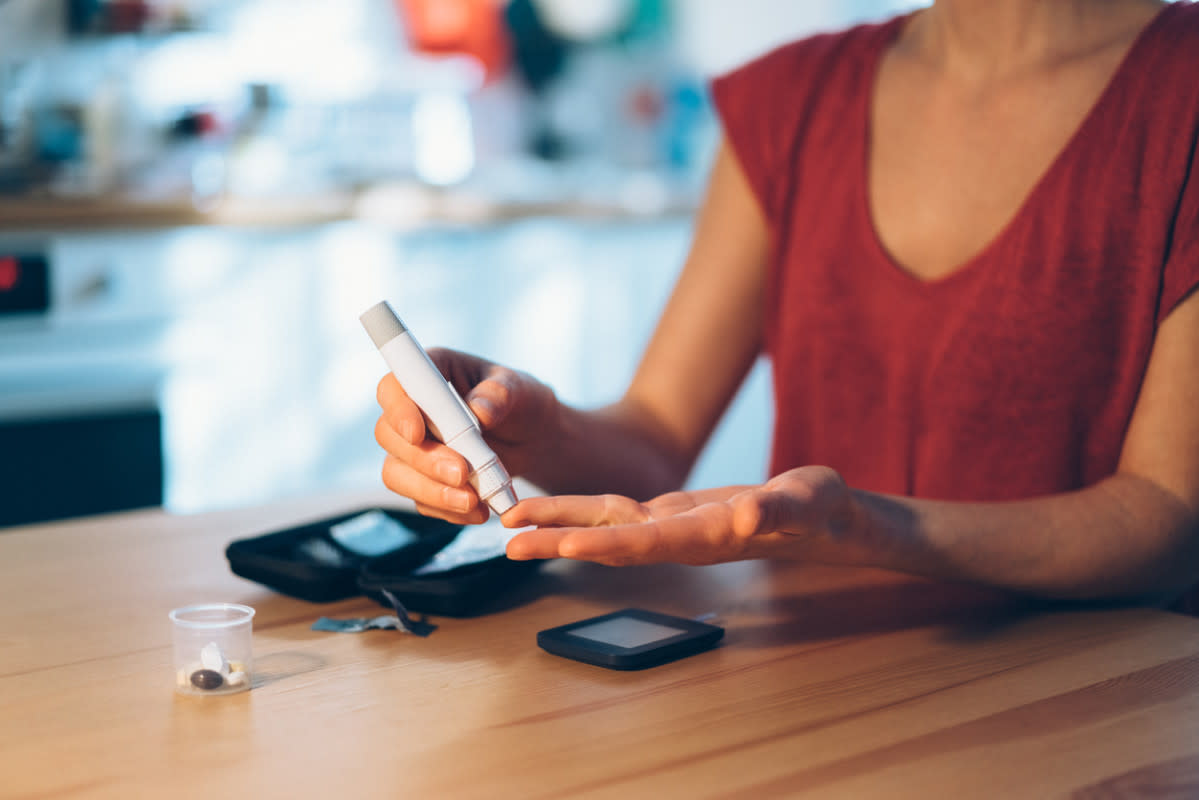The One Thing You Should Never, Ever Do If You Have Prediabetes, According to an Endocrinologist

Woman with prediabetes
More than one in three Americans have prediabetes, a health condition that raises the risk of diabetes and other health conditions. Prediabetes means that one’s blood sugar levels are higher than normal, but not high enough to warrant a medical diagnosis of type 2 diabetes.
Prediabetes is dangerous because it increases the risk of heart disease, stroke and early death. But here’s the good news: it’s completely reversible through diet and lifestyle changes. With this in mind, we asked an endocrinologist what people with prediabetes can do to reverse their health condition as well as the one habit they should avoid completely.
Related: The #1 Food That Helps With Insulin Resistance, According to Dietitians Who Specialize in Diabetes
The Habit Individuals With Prediabetes Should Never Do
Dr. Andrew Timothy Kraftson, MD, an endocrinologist and Clinical Associate Professor in the Division of Metabolism, Endocrinology, and Diabetes at the University of Michigan, says that if you have been diagnosed with prediabetes, there’s one habit in particular you should avoid: consuming carb-sweetened beverages.
Carb-sweetened beverages include soda, sugar-sweetened coffee drinks (like frappuccinos), fruit punch, lemonade and many energy and sports drinks. Drinks like these are sweetened with sugar, high fructose corn syrup, fruit juice concentrates and other sweeteners and are the single largest source of added sugar in the U.S. Consuming these types of drinks regularly increases the risk of developing prediabetes in middle-age adults—and certainly doesn’t help reverse the health condition if you already have it.
Related: This Is the Early Type 2 Diabetes Sign That's Missed the Most Often, According to an Endocrinologist
In addition to increasing the risk of prediabetes, scientific research shows that regularly consuming sugar-sweetened beverages is also linked to obesity, which is not surprising considering that people with obesity are more likely to be diagnosed with prediabetes or diabetes than people who do not have obesity.
“For most individuals with prediabetes, modest weight reduction can be helpful. Scientific studies, such as the Diabetes Prevention Program, demonstrated that even a 5 to 7% loss of weight can reduce the risk of developing diabetes by almost 60%,” Dr. Kraftson says of this.
Other Helpful Tips for Reversing Prediabetes
Since even modest weight loss can make a big difference for people with prediabetes, putting habits in place that support this goal is helpful. Dr. Kraftson says that one way to do this is by eating less simple carbs, which includes foods such as white bread, pastries and pasta.
“Carbohydrates should be moderated and complex carbohydrates are preferred over simple or high-processed carbohydrates,” Dr. Kraftson explains. When it comes to consuming carbohydrates, Dr. Kraftson suggests going for ones that are low-glycemic, such as most fruits and vegetables, beans, nuts, low-fat dairy products, brown rice, steel-cut oats and whole wheat bread.
Related: 13 Foods That Help With Diabetes, from Raspberries and Blueberries to Tuna and Brussels Sprouts
Additionally, Dr. Kraftson says it’s important to prioritize exercise, which helps improve glucose levels and insulin sensitivity. According to the American Medical Association, high-intensity interval training (HIIT) workouts can be especially helpful in controlling glucose levels and also help with healthy weight loss. If you have prediabetes, it’s recommended to exercise for 30 minutes three to five days a week.
According to Dr. Kraftson, it’s important for people with prediabetes to educate themselves on how to manage their health condition. Being diagnosed with prediabetes can feel overwhelming, but there are many free resources available that can provide tips for managing and even reversing your health condition. Dr. Kraftson says not to shy away from asking your primary care provider for resources. “There are also programs such as the Diabetes Prevention Program and Omada Health that provide education,” he adds.
Remember: Prediabetes is reversible, so don’t let a diagnosis discourage you from taking charge of your health. By prioritizing a healthy diet, minimizing sugar-sweetened beverages and exercising regularly, you’ll be on your way to having prediabetes in your rearview window. Just because it’s your present, doesn’t mean it has to be your future.
Next up, see the number one way to lower blood sugar naturally.
Sources
Dr. Andrew Timothy Kraftson, MD, endocrinologist and Clinical Associate Professor in the Division of Metabolism, Endocrinology, and Diabetes at the University of Michigan
Prediabetes—Your Chance to Prevent Type 2 Diabetes. Centers for Disease Control and Prevention.
Diagnosis and Management of Prediabetes: A Review. JAMA. 2023.
Sugary Drinks. Harvard T.H. Chan School of Public Health.
Sugar-Sweetened Beverage but Not Diet Soda Consumption Is Positively Associated with Progression of Insulin Resistance and Prediabetes. Journal of Nutrition. 2016.
Sugar intake from sweetened beverages and diabetes: A narrative review. World Journal of Diabetes. 2021.
The Role of Obesity in Type 2 Diabetes Mellitus—An Overview. International Journal of Molecular Sciences. 2024.
Diabetes Prevention Program (DPP). National Institute of Diabetes and Digestive and Kidney Diseases.
A good guide to good carbs: The glycemic index. Harvard Health Publishing.
Why your patients with prediabetes might benefit from interval training. American Medical Association.

